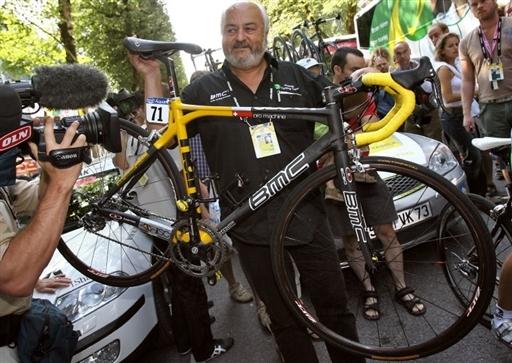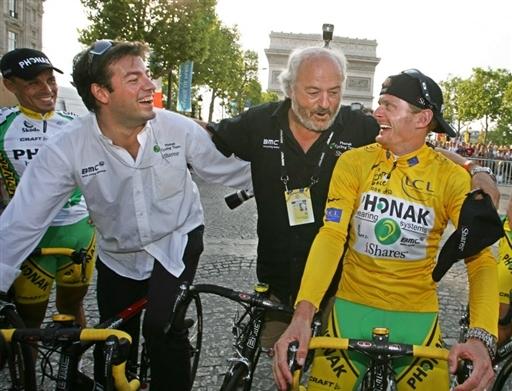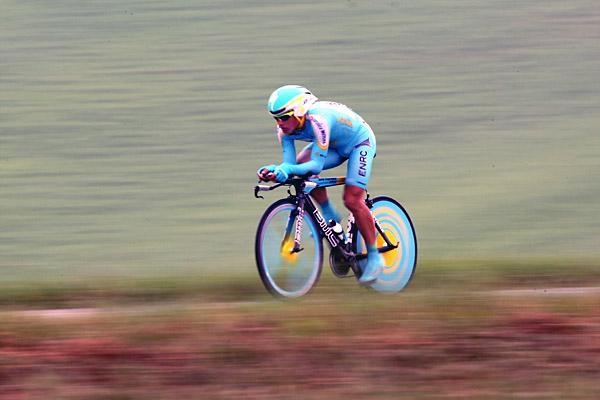Rihs' remedy for the cycling blues
Part I: Rebirth of a cycling power broker after Phonak and Astana



Could it be third time lucky for BMC's Andy Rihs? The affable and enthusiastic owner of this Swiss bike company has endured heartbreaks during his time in the realm of professional cycling, and as another season rolls into action, he returns with a squad brimming with talent, built from the ground up.
The energetic 67-year-old has indeed constructed this latest team from the ashes of campaigns past and the subsequent lessons learned; his comments suggest that the episodes involving Phonak, Floyd Landis, Astana, Alexandre Vinokourov and Andrey Kashechkin have caused considerable heartbreak but two aspects stand out, however: his enthusiasm is infectious while his drive and ability to organise is unquestionable.
It's for these seemingly conflicting reasons - simultaneous caution and passion - that many in the sport are optimistic about BMC Racing's chances in 2010. Not to mention the fact that current world champion Cadel Evans, US national champion George Hincapie and 2008 world champ Alessandro Ballan will be plying their trade in black and red this season.
On top of the world...
"It's correct to say that I had to close down that team; of course I was very disappointed - you could also use another word - that we had this problem," Rihs says of his experience with the Phonak Hearing Systems team. He had poured millions of euros into the squad that was home to the likes of Santi Perez, Floyd Landis and Tyler Hamilton earlier in the decade.
All three riders returned positive tests during their tenure with the team that garnered it headlines worthy of Rihs' withdrawal from the professional ranks of the sport. "I wasn't in the mood to continue [with cycling] at that time and I was really depressed about it - going from the highest possible moments down to the earth - and this was the statement I made when I said, 'I don't want to do professional cycling any more'," explains Rihs.
Those highs included 'winning' the Tour de France with Landis - for a couple of days, at least - in addition to a gold medal with Hamilton in the time trial at the Athens Olympics and a Vuelta a España podium place with Perez. All these achievements were annulled - officially or otherwise - due to the positive drugs tests each one of these riders returned, which indeed brought Rihs and the team crashing down to earth.
Get The Leadout Newsletter
The latest race content, interviews, features, reviews and expert buying guides, direct to your inbox!
"This didn't mean that I didn't like cycling but at that time we already had a small team to give other riders a chance, young riders who didn't have experience and we pushed for them to get that," says Rihs, referring to the BMC Racing Team, which at that time was being run as a Continental squad in the United States. It was the seed for the current Professional Continental squad, but first there was a sponsorship deal that quickly went sour.
He decided that BMC would sponsor Team Astana, post-Operación Puerto, the team boasting a new management crew, a supposedly fresh outlook and a clean slate after the grimy revelations of Manolo Saiz's tenure. All that had been heralded didn't eventuate, and Rihs found himself in the same hole all over again.
"Over time all this was healing and I continued to be with BMC and logically heavily involved with cycling... the conclusion was that before we closed [their involvement with cycling] we had to make an arrangement with Astana - with Marc Biver - and we provided all the material and said, 'Okay, you can continue with the BMC bikes'," says Rihs.
Alexandre Vinokourov's positive test for blood doping during the controversy-riddled 2007 Tour de France, followed by countryman Kashechkin's doping violation shortly thereafter spelled the end of Rihs' time supporting some of the highest-profile athletes in cycling.
"We saw that it was the wrong approach, just sponsoring [a team] with bikes because we had no impact on the direction and we also 'retired' again when we had the case of Vinokourov," explains Rihs. "He won on our team time machine and then there were doping issues... we said, 'Okay, it's finished' and we pulled everything back. We said that we didn't want to be involved in doping any more."
Developing from the ground up
The influence in direction that Rihs speaks of has come in the form of the BMC Racing team. Several years into its development phase, it has been a mainstay of the US racing scene for the past few seasons and with the addition of riders such as the aforementioned Hincapie, Evans and Ballan, plus Classics performer Karsten Kroon and promising youngster Mauro Santambrogio, the scope for promotion of the BMC brand is immense.
Rihs says that the development of BMC - the bike company - parallels that of the racing team - "[The team started] at a time when we were continuing developing the BMC company - a young company - step by step. The short story is that we now have a team directly identifiable with the product and we saw the marketing potential.
"I'd say without the BMC bike I wouldn't make a team - I'd maybe help to do something, but with the BMC factory in the background it makes a lot of sense to have this factory team - an R&D factory team - to expand the business," he adds. Learning from his experiences with Phonak and Astana, the goalposts have been clearly identified. A viable, long-term, promotional tool for his bikes is key to Rihs' direction of BMC Racing.
While Rihs' participation represents a re-entry into cycling, there are comparisons to be made with HTC-Columbia boss Bob Stapleton, who has made his presence felt in the sport having emerged from a properous business career.
Stapleton turned the former T-Mobile squad from an outfit beset by controversy and rebuilt it to become one of the leading lights in the professional ranks. Rihs has also enjoyed great success in the commercial world and brings a similar type of passion to professional cycling.
"Maybe we are coming from a different angle compared to the traditional team," says Rihs of the comparison to Stapleton. "Normally the traditional team emerges from somebody who has a race team and looks at for whom [which company] they can race. We created the race team for the purpose of promoting the brand, which is a little bit different.
"We can afford to do it, and we didn't hire somebody to do it for us. We created it and we want to shape the way we want," he continues. "Maybe this gives the team a little bit different spirit and possibly a closer connection to the sponsors compared to just racing for something else all the time.
"For example, maybe today you race for ketchup and tomorrow you race for a phone [company]... But it doesn't provide a connection to the team. We want to have a higher identification with our riders," he says.
Read part two of Cyclingnews'' conversation with BMC Racing's Andy Rihs as he talks about the current state of cycling, his aspirations for the team and why he had to get back into the sport.